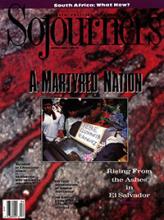The release of Nelson Mandela from prison after more than 27 years has unleashed a process that can ultimately only lead to majority rule in South Africa. There is freedom in the air! "The genie is already out of the bottle, and there is no way of putting it back," observed U.S. congressional delegate Walter Fauntroy (D-D.C.) on the eve of Mandela's release.
The release of Nelson Mandela is a historic moment that is likely to be celebrated for generations to come as the beginning of the end of white domination in South Africa. It is an event that nevertheless needs to be carefully assessed so that its full potential may be realized.
At the height of the U.S. civil rights campaign, Martin Luther King Jr. drew on the words of an American slave to place the struggle of black Americans in perspective. "We ain't what we ought to be, we ain't what we want to be, and we ain't what we are going to be," he said. "But thank God we ain't what we was!"
The struggle in South Africa has entered a qualitatively new phase. Theologian Karl Barth would suggest that South Africans are "living between the times." Political economist Antonio Gramsci once spoke of such crucial periods of history as those decisive moments within which "the old is dying and the new cannot [yet] be born."
The words of South Africa's Kairos Document are even more descriptive of the present situation than they were of the difficult days in 1985 when it was first published. It describes the kairos as "a dangerous time. " It recognizes that "if this opportunity is missed and allowed to pass by, the loss...will be immeasurable."
South Africa has entered such a phase of its history. It is probably closer to resolving its centuries-old conflict than ever before. But the end is not yet!
Read the Full Article
